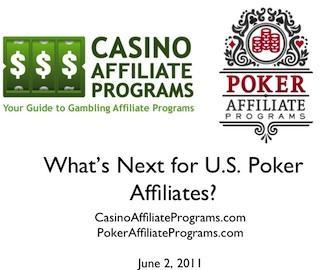No matter what happens in the next six months, 2011 will always be remembered as the year online poker changed forever.
As we watch the industry cope with the changes forced by the U.S. government in recent months, it’s important to realize that, unlike similar events in the past, 2011’s changes will likely create a new and permanent poker affiliate market.
Background: Read about “Black Friday” here.
The poker industry, in and out of the U.S., underwent a similar jolt in 2006 with the passing of the Unlawful Internet Gambling Enforcement Act (UIGEA). That allowed the U.S. to prosecute some major online gambling brands like PartyGaming and BetonSports, forcing them out of the market. Many other operators soon left the U.S. voluntarily, like 888 and the entire Microgaming network.
PartyGaming and BetonSports paid their dues to the U.S. government and have been absolved of legal trouble. They’re still not able to enter the U.S. market, but are well-positioned to apply for U.S. licenses when that day comes.
Of course, that day will come, and probably sooner than we realize. Most politicians seem to understand this, finally; even longtime gambling opponent Rep. Spencer Bachus recently said “if there’s gambling, it has to be regulated.”
But when that happens, there’s no clear indication that it’ll be existing online gaming brands like 888 and PartyGaming that get licensed. It’s far more likely (particularly given Nevadan Senate Majority Leader Harry Reid’s involvement) that the U.S. will establish a completely new new licensing system that will favor U.S.-based casino brands like Caesars Entertainment and Bally’s and may even exclude non-U.S.-based companies.
Why “Black Friday” is really UIGEA 2.0
That’s why this year’s “Black Friday” crackdown is different than what happened in 2006. As poker affiliate pro Jeremy Enke recently told Casino Affiliate Programs, the events of Black Friday are “exponentially more significant.”
Unlike 2006, when PartyPoker was forced out of the U.S., there’ll be no Full Tilt or PokerStars to spring into the gap. The gap will remain until new regulations have passed.
 Why? In 2006, the government cracked down on some big targets, but it didn’t operate on this large of a scale. In 2011, the government went directly after all the major poker rooms’ finances, cutting them off from the funds deposited by players.
Why? In 2006, the government cracked down on some big targets, but it didn’t operate on this large of a scale. In 2011, the government went directly after all the major poker rooms’ finances, cutting them off from the funds deposited by players.
“It was just done so quickly, so dramatically,” Herb Jenkins of Poker Affiliate Solutions told CasinoAffiliatePrograms.com. “Even though they had three years of planning, I don’t think they realized just what they did and how many people they affected.”
Unlike 2006, as Herb explained in a recent CAP webinar, the actions of 2011 has directly affected the bankrolls of millions of players, many of whom have yet to get paid.
Background: Listen to CAP’s recent Black Friday webinar here.
So, 2011 is the evolution of what began in 2006, a more sinister second phase where the threat of the UIGEA — which has always targeted payment processing — is finally carried out.
What should affiliates do?
Despite all this trouble, and maybe because of it, there remain big opportunities in poker affiliate marketing.
“There’s a huge opportunity here for somebody who can weather a short tern storm and for somebody who can be very adaptable,” says Aaron Gerdes of DeucesCracked.com. “It’s an opportunity, because a lot of players are getting unseated, new agreements are going to be made.”
How can affiliates better understand and take advantage of these opportunities? We’ll focus on that question next week at the CAP Blog.